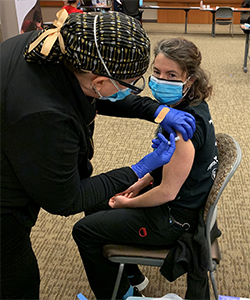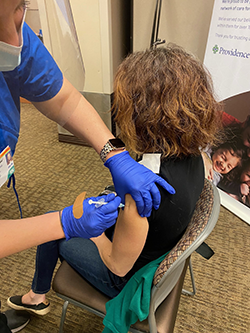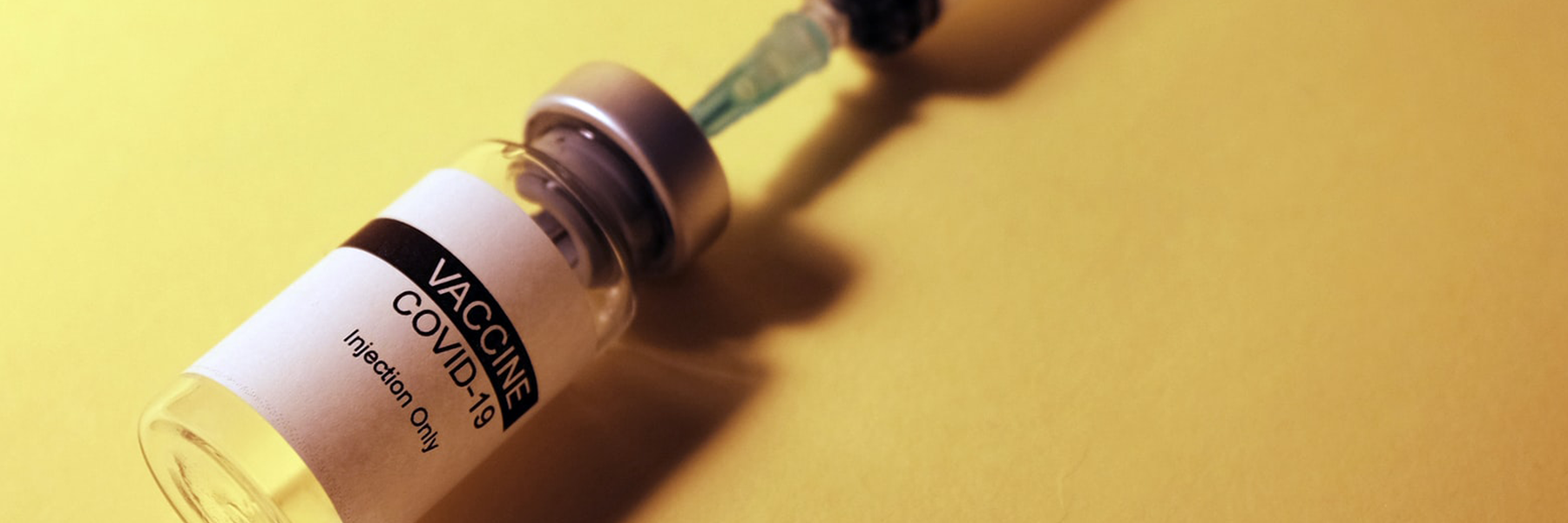 On December 23, 2020, Roseann Devlin proudly pulled up the sleeve of her MG Walk t-shirt to receive her first COVID-19 shot. A certified oncology nurse at Little Company of Mary Hospital in Torrance, California, Roseann was eligible to receive her vaccination as part of the first wave of health care workers. She is diagnosed with myasthenia gravis and has lived with the disease for a number of years.
On December 23, 2020, Roseann Devlin proudly pulled up the sleeve of her MG Walk t-shirt to receive her first COVID-19 shot. A certified oncology nurse at Little Company of Mary Hospital in Torrance, California, Roseann was eligible to receive her vaccination as part of the first wave of health care workers. She is diagnosed with myasthenia gravis and has lived with the disease for a number of years.
Though she has MG and is taking immunosuppressant drugs, she did not hesitate to get the vaccine. As a nurse, she has seen many patients with severe COVID-19 symptoms and wanted to avoid any serious complications. Though there is some debate in medical circles about vaccine efficacy levels for people with autoimmune diseases, “it’s still worth it to me to be vaccinated because getting full-blown COVID is absolutely terrifying to me,” she says.
She knows firsthand and has a unique perspective…because she contracted COVID-19. On that day in December when she received her first shot, Roseann was unexpectedly exposed to a COVID-19-positive patient at work. Seven days later, she developed symptoms – a racing heart, joint pain, fatigue, dry cough, and a low-grade fever. She tested COVID-19 positive the next day.
“It takes your body about three weeks [after a vaccination shot] to create antibodies against the thing you’re trying to prevent,” Roseann shares. The vaccine had not yet done its job of creating protective antibodies in her blood at the time of her exposure to the virus.
She spent the next two weeks feeling exhausted, weak and feverish, and she had to isolate from her loved ones.
“My boyfriend would drop off a plate of food outside my door. I’d eat on the bed. I could feel the joints in my jaw – even eating was painful.” After the worst of her symptoms ended, she still felt tired – “like I’d done some kind of boot camp exercise club.”
She says she understands why people with MG might have concerns about taking the vaccine. It has not yet been widely tested on people with autoimmune disorders or other chronic diseases. People may be worried about side effects, or the likelihood of the reduced efficacy. But she hopes that her story can encourage others in the MG Community to take the vaccine.
“My experience with the vaccine was that my arm was very sore, but that pales in comparison to the joint pain and headaches I had for days with the real coronavirus. When I get any vaccination, like the flu shot, I tend to have that fatigue, a little more eye droop the next day. But, I can plan for that and manage it effectively.”
She also stresses that lower efficacy is better than no efficacy.
“If it saves you from the agony of full-blown COVID – and instead you have a light case that you could manage at home – it’s absolutely worth it to get the vaccine.”
 Her colleague, Job Clay, agrees.
Her colleague, Job Clay, agrees.
Like Roseann, Job is a registered nurse at Little Company of Mary Hospital. Also like Roseann, he has MG. The medical cardiology telemetry floor where he normally works has been converted into a COVID ward, so he has treated many COVID patients since the pandemic began.
“The decision to get vaccinated is ultimately up to you – with guidance from your doctor – but I am working every day in the face of COVID, and believe me, the vaccine’s side effects are way more appealing than the symptoms that come with full-blown COVID,” he says.
Job received his first dose of the Pfizer vaccine on December 23, and his second on January 7. While side effects from the second shot were worse than the first and lasted about 48 hours, “they were not bad enough to prevent me from going to work those two days.”
As COVID infections begin to decline after a devastating winter wave, and vaccines offer hope for the future, health care workers like Roseann and Job still face crushing patient loads.
They send out the same plea that doctors and nurses have shared for months:
“Whether you decide to get the vaccine or not, please continue to be diligent about your hand hygiene, wear a mask and practice social distancing,” says Job. “But strongly consider rolling up your sleeve and getting the vaccine.”

